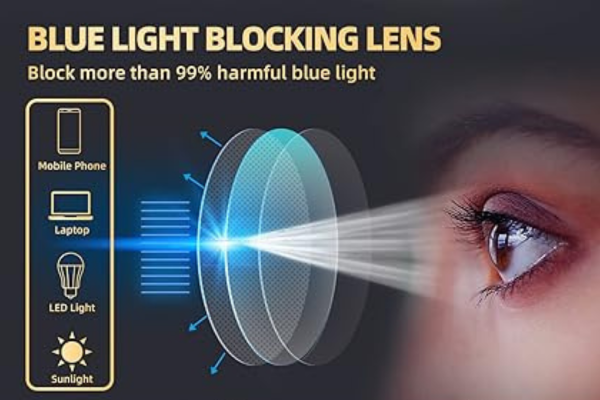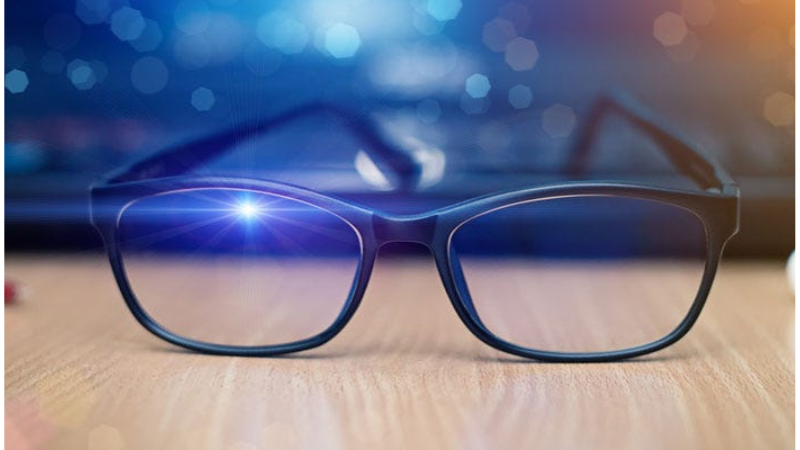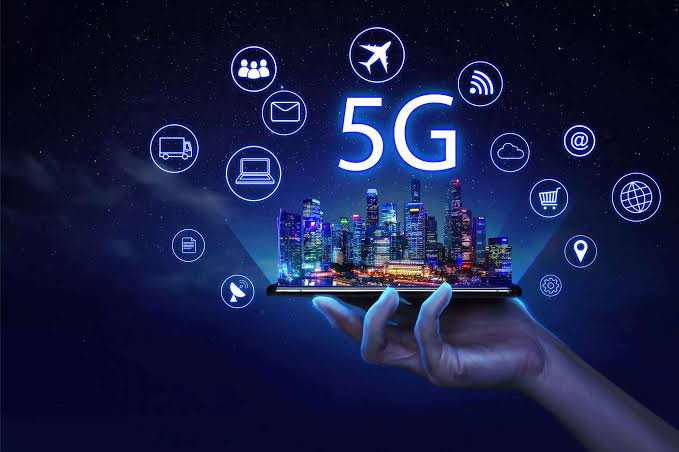“Blue light glasses” are eyeglasses that have lenses specifically designed to filter out or block blue light emitted from screens such as computers, smartphones, and tablets. Blue light is part of the visible light spectrum and is emitted by many digital devices as well as LED and fluorescent lighting.
Excessive exposure to blue light, especially at night, has been associated with eye strain, disrupted sleep patterns, and potential long-term health issues. Blue light glasses are marketed as a way to mitigate these effects by reducing the amount of blue light that reaches the eyes.
Other Names Of Blue Light Glasses

- Blue light blocking glasses
- Blue cut lens
- Blue lens glasses
- Computer/screen glasses
- Anti-reflective (AR) glasses
- Digital eyewear:
Who Needs Blue Glasses ?

Blue light glasses can be useful for:
- People who spend lots of time on screens.
- Those who have trouble sleeping due to screen use.
- Individuals sensitive to bright lights or with eye conditions.
- People worried about long-term eye health.
- Children and teenagers exposed to screens often.
They may reduce eye strain, help with sleep, and protect eyes from potential damage. However, they’re not necessary for everyone.
Do Blue Light Blocking Glasses Really Work ?

Yes, blue light blocking glasses can be effective in reducing the potential negative effects of blue light exposure from digital screens and artificial lighting. Here are some ways in which they can work:
- Reducing Eye Strain: Blue light glasses can help reduce eye strain and fatigue associated with prolonged screen use by filtering out a portion of the blue light emitted by digital devices. This can lead to more comfortable viewing experiences, especially for individuals who spend extended periods in front of screens.
- Improving Sleep Quality: Blue light exposure, particularly in the evening or at night, can disrupt the body’s natural sleep-wake cycle by suppressing the production of the hormone melatonin. Blue light blocking glasses can help mitigate this effect by reducing exposure to blue light before bedtime, potentially leading to improved sleep quality and better overall sleep patterns.
- Protecting Eye Health: Some studies suggest that chronic exposure to blue light, especially from digital screens, may have negative effects on eye health over time, such as an increased risk of age-related macular degeneration (AMD). Blue light blocking glasses can offer protection against these potential risks by reducing the amount of blue light reaching the eyes.
While blue light blocking glasses can be effective in addressing these concerns, it’s important to note that they are not a cure-all solution and may not eliminate all potential negative effects of blue light exposure. Additionally, individual responses to blue light glasses may vary, and results may depend on factors such as the specific type of glasses used, the level of blue light filtration provided, and individual differences in sensitivity to blue light.
Overall, blue light blocking glasses can be a helpful tool for reducing eye strain, improving sleep quality, and protecting eye health, especially for individuals who spend a significant amount of time in front of screens.
Is Blue Rays Harmful For Humans ?

Blue rays, particularly in the context of digital screens and artificial lighting, can have some potential negative effects on humans, primarily due to the impact of blue light on our sleep patterns and eye health, as discussed earlier. Here’s a summary of why blue rays can be harmful:
- Disruption of Circadian Rhythm: Blue light, which is abundant in blue rays, can disrupt our body’s natural sleep-wake cycle, leading to difficulty falling asleep and disrupted sleep patterns, particularly when exposure occurs in the evening or at night. This disruption is caused by the suppression of melatonin, a hormone that regulates sleep.
- Eye Strain and Fatigue: Prolonged exposure to blue rays from digital screens can cause eye strain, dry eyes, and general discomfort. This is especially common in individuals who spend extended periods looking at screens without taking breaks.
- Potential Retina Damage: There is concern that prolonged exposure to high-intensity blue light, such as that emitted by digital screens, may lead to damage to the retina, the light-sensitive tissue at the back of the eye. Some studies suggest that this could increase the risk of age-related macular degeneration (AMD) and other eye-related issues.
- Headaches and Migraines: Blue light exposure has been associated with an increased frequency and severity of headaches and migraines in some individuals, particularly those who are sensitive to light.
- Long-Term Health Risks: While more research is needed, some studies have suggested that chronic exposure to blue light may be associated with an increased risk of certain health conditions, including obesity, diabetes, cardiovascular disease, and certain types of cancer. However, the evidence for these associations is still evolving and requires further investigation.
How much blue light do blue light glasses filter ?

The amount of blue light filtered by blue light glasses can vary depending on the specific type and brand. Generally, blue light glasses are designed to filter out a significant portion of the blue light emitted by digital screens and artificial lighting sources.
Some blue light glasses may filter around 30% to 40% of blue light, while others may filter up to 90% or more. The level of blue light filtration is often specified by the manufacturer or indicated in product descriptions.
It’s important to note that while blue light glasses can reduce blue light exposure, they do not eliminate it entirely. The effectiveness of blue light glasses in filtering blue light can also depend on factors such as the lens material, coating technology, and the specific wavelengths of blue light targeted.
If you’re considering purchasing blue light glasses for specific concerns or preferences, it’s a good idea to research the product and its specifications to ensure that it meets your needs.
Conclusion
It’s important to note that not all blue light is harmful—blue light is present in sunlight and is necessary for regulating our circadian rhythm and boosting mood and alertness during the day. However, excessive or inappropriate exposure to blue light, particularly from artificial sources such as digital screens, can have negative effects on our health and well-being.
Overall, while blue rays themselves are not inherently harmful, excessive or inappropriate exposure to blue light, particularly from digital screens and artificial lighting, can have negative effects on our health and well-being. It’s important to take steps to mitigate these effects, such as using blue light filters on screens, limiting screen time before bed, and taking regular breaks from screen use.







